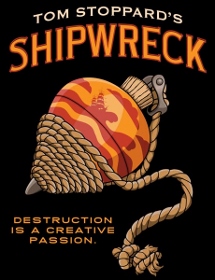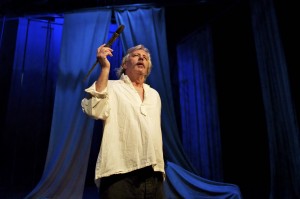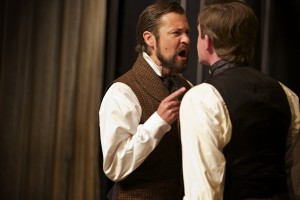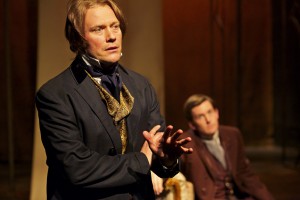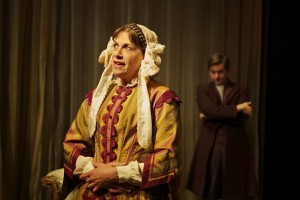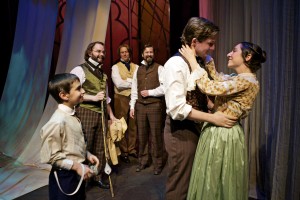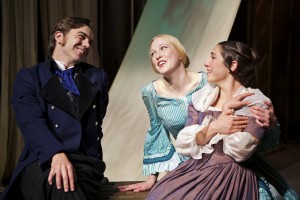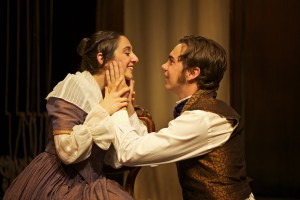SHIPSHAPE
Imagine a boat named “Utopia” launched in the 1830s, floating towards Moscow. As the boat sails onward, it becomes heavier, taking on cargo, passengers, and the weight of the future. As it nears Moscow, the name changes, and we are now watching the approach of “Socialism.” You’ve officially, if metaphorically, boarded Tom Stoppard’s trilogy of plays comprising The Coast of Utopia (2002).
Shipwreck is the second entry in Stoppard’s three-play cycle, which is being staged at Shotgun Players in Berkeley. Shotgun put up Voyage last year, and will mount Salvage in 2014 (several performances of Voyage are being offered this year, and the full cycle will be offered in 2014, so each year there’s an opportunity to see the plays sequentially).
With this three-year commitment, Shotgun Players has positioned itself as the “Little Theatre that Could.” We’re talking six cumulative hours of mostly non-professional large casts in small spaces, with the actors hands-on making the scenic changes. This is theatre where everyone digs in, on stage and in the audience. You’ll find treasure along the way, and maybe gain a new world view.
Shipwreck’s protagonist is philosopher Alexander Herzen, the father of socialism. Herzen’s conversations with revolutionary-in-training Michael Bakunin, novelist Ivan Turgenev, literary critic Vissarion Belinsky, and poets Nicholas Ogarev and George Herwegh, serve to hone Herzen’s ideas on what shape a perfect society might take. On the estrogen side we have Herzen’s wife, Natalie; Herzen’s mother, Madame Haag; Ogarev’s estranged wife, Maria; Herwegh’s wife, Emma, and Natasha Tuchkov, who appears only long enough to make every one fall in love with her.
This is only a partial list of the play’s characters. And each hour-long act has 10 scenes. This makes for a theatrical whirlwind of in-and-out, up-and-down, here-and-gone action.
The play’s characters and plot are based on historical fact. Herzen, his family, and many mentioned above move to Paris in 1848, just in time for a front-row seat as the French monarchy is overthrown yet again and another new regime comes to power. The Russians gaze at Europe aflame with revolutionary fever and wonder when Mother Russia’s turn will come. What shape will the new ideal society take? “Where are we off to, who’s got the map?” Herzen asks. And we know that Lenin waits in the future, along with the rise of communism and the terrors of Stalin. This creates a bittersweet counterpoint to the discussions on societal and personal freedoms.
But for the all big questions and far-ranging discussions, it is the day-to-day concerns of the family unit that form the play’s backbone. Everyone is so human in Shipwreck that we care about each one. We learn in the first scene that Herzen’s youngest son is deaf; in typical Stoppard fashion, the deaf Kolya responds to the sounds of thunder and artillery, but never when he can be seen by others. When Kolya wanders off, the searchers call “Kolya!” even as they remind each other Kolya cannot hear them. But the audience wonders what Kolya can understand, and if he represents those who may hear but choose not to listen.
There are the small moments Stoppard creates that adhere to the memory like a burr: Belinsky, wracked with shallow consumptive coughs during a discussion on literature, takes his leave to inspect a red and gold Parisian dressing gown that has caught his eye; the way that Madame Haag is disconcerted by the servants who change in every city, adding momentary local color and humor (Haag prefers a more servile civility in the working classes); Herwegh, returning from battle, is startled when greeted jointly by his pregnant mistress and his infant-coddling wife; the bittersweet scene when prim Natalia, enraptured with Natasha, pets her, smells her hair, and exclaims how good she smells and feels; and Herzen, who watches Natalia and Natasha, not understanding that Natalia’s sensuality is being awakened, and will soon find herself a lover.
Shotgun Players presents a solid production that flows smoothly and keeps the audience engaged. The very few lulls tend to be monologues, as once the repartee spigot is turned off, the action trickles slowly, and the audience has come to expect a moving-right-along pace. The cast (mostly non-professionals, remember) is committed to the material, and I felt an almost religious fervor to the cast’s enjoyment during the production, as if bringing Stoppard to the masses is their one ambition.
This is an ensemble piece, with so many memorable contributions that it makes it difficult to individually recognize performances. There are two standouts: Nick Medina as Belinsky, whose passion for literature cannot be dimmed by the consumption that wracks his body, and Patrick Kelly Jones as Herzen, giving spot-on line readings with such natural flair you wonder if he is ad libbing a Stoppard script.
Shotgun Players Artistic Director Patrick Dooley directs with a sense of choreography, as the actors’ movement is key to keeping the 20 scenes moving smoothly. His primary credit may be the inspiration he has infused the cast with, resulting in consistent focus and purpose onstage.
Ashby Stage is a black box theatre with the advantage of depth to the back wall, and the set was smartly designed by Nina Ball with two long canvas drapes which could be manipulated with pulleys to quickly change shape and create a new space.
“We are bookish people, with bookish solutions,” Herzen says. And some reading would be useful before you attend performances. Check online for extensive biographies of all mentioned above, including Herzen’s memoirs. But don’t be concerned if you aren’t someone who likes to do research before attending a play. In the program you’ll find detailed synopses of Voyage and Shipwreck, and helpful character biographies. If you prefer not to rely on the program, arrive a half hour before the curtain rises, take a seat for the pre-show presentation, and an actor will happily spend 15 minutes immersing you in the historical and literary framework.
photos by Pak Han
Shipwreck
Shotgun Players at Ashby Stage in Berkeley
scheduled to end on April 28, 2013
for tickets, visit https://shotgunplayers.org/
